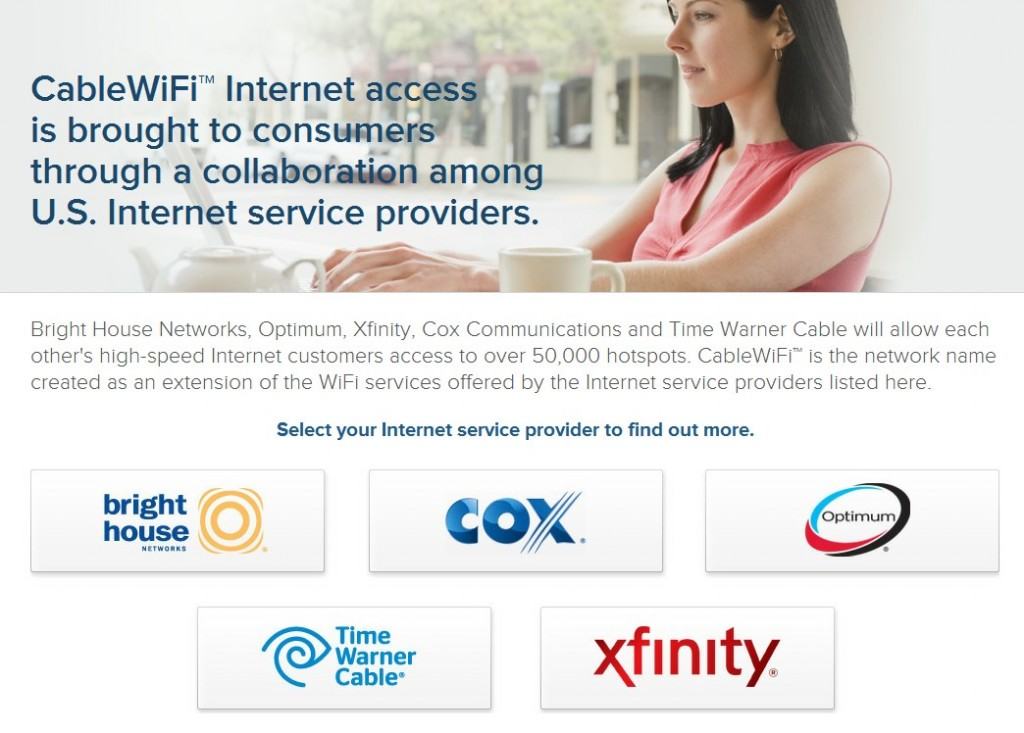 Wi-Fi access is about to become a lot more ubiquitous if you happen to buy broadband from Comcast, Time Warner Cable, Cablevision, Bright House Networks, or Cox. All five companies on Monday announced they will open up their free Wi-Fi hotspots to customers of any of these companies nationwide.
Wi-Fi access is about to become a lot more ubiquitous if you happen to buy broadband from Comcast, Time Warner Cable, Cablevision, Bright House Networks, or Cox. All five companies on Monday announced they will open up their free Wi-Fi hotspots to customers of any of these companies nationwide.
The collaborative agreement extends the authentication platforms cable operators use to verify customer accounts when granting access to services like TV Everywhere — the online video streaming services operated by pay television providers. By sharing basic account information, customers traveling outside of their home cable service area can “roam” on free Wi-Fi networks operated by the other providers.
For example, a Cablevision subscriber who lives on Long Island will be able to access Bright House Networks’ Wi-Fi in central Florida or Time Warner Cable’s growing wireless network in Los Angeles.
The cable industry calls it a back door entry into mobile data, and unlike its existing partnership with Clearwire for WiMAX 4G service, Wi-Fi hotspots are available at no additional charge.
“We believe that Wi-Fi is a superior approach to mobile data,” said Kristin Dolan, head of projects at Cablevision. “Cable providers are best positioned to build the highest-capacity national network offering customers fast and reliable Internet connections when away from their home or business broadband service.”
More than 50,000 Wi-Fi hotspots are to be included in the project, all unified under the name “CableWiFi.”
Eventually, the companies hope to unveil automatic log-ins on the network, regardless of where customers access it.
The industry is aggressively expanding Wi-Fi services to give subscribers another reason to stick with their local cable company. Some may require customers to maintain both a cable-TV subscription and broadband to qualify for the service, others will only require a current broadband account. The free add-on may also make subscribers think twice about canceling service if it means losing access.
Comcast, Cablevision, and Time Warner Cable already have a deal in place to share their networks in southwestern Connecticut, New York City, parts of New Jersey and Philadelphia.
Cable operators will target high-traffic areas for Wi-Fi expansion — especially public parks, beaches, malls, eateries, stadiums and convention centers. Don’t expect cable Wi-Fi to be common in residential neighborhoods, and users will have to temper their expectations. Most provide access suitable for web browsing and e-mail, but often have trouble keeping up with streaming video and other high bandwidth services.


 Subscribe
Subscribe
“The consumer advocacy group Public Knowledge on Monday criticized an announcement by a group of major cable companies that their customers would now be able to access each other’s Wi-Fi hotspots, saying the decision would lessen competition.”
http://thehill.com/blogs/hillicon-valley/technology/228677-consumer-group-blasts-cable-operators-wifi-roaming-deal
Can anyone explain to me why this deal is a “bad thing”? It certainly looks like a “good thing” to me, but what do I know . . .
In the context of the co-marketing agreement between the cable industry and the nation’s biggest wireless operator (Verizon Wireless), building out Wi-Fi leaves consumers dealing with the same duopoly for telecommunications services. If the marketing agreement can (and some think will) eventually expand into Wi-Fi, Verizon can offload its traffic onto cable-owned Wi-Fi they need not build themselves. More generally, it reminds me of Shaw Communications in Canada who originally planned to compete in the cellular mobile space but abandoned those plans because they didn’t want to spend the money. Instead, they are building out Wi-Fi networks, which are much… Read more »
Phillip, I get that you don’t like the VZ co-marketing deal, but can we stick to the subject? The 400 word article you wrote was about CABLE companies allowing each others customers to use their wifi networks. In 400 words, you did not mention Verizon even a SINGLE time.
So while you have every right to bash VZ for whatever reason on your own blog, you didn’t answer my question: why is it that five cable companies allowing each others customers to use their wifi networks is a “bad thing”?
I think I answered your question. I don’t have any problem with customers being able to roam on cable Wi-Fi networks.
You are the one using the words “bad thing,” not me. I provided you with an explanation why public interest groups have an issue with this development.